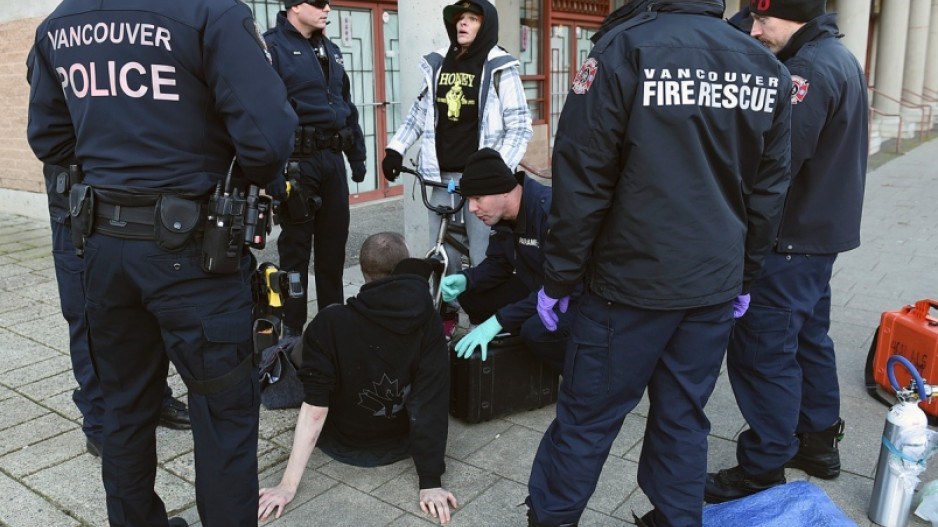Overdose deaths in B.C. continue in high numbers as the province experienced 175 illicit drugs deaths in July.
It’s the third consecutive month with more than 170 suspected illicit drug deaths reported to the BC Coroners Service. It’s five consecutive months with the figure over 100 deaths.
The illicit drug toxicity death total for July 2020 represents a 136% increase over the number of deaths seen in July 2019, which saw 74 fatalities. The BC Coroners Service has detected a sustained increase of illicit drug toxicity deaths since March.
There have been 909 illicit drug deaths to date in 2020 in B.C.
Deaths began to mount significantly in 2016, in which there were 991 deaths. That rose to a peak of 1,546 in 2018 before falling to 981 last year.
“The number of people dying in B.C. due to an unsafe drug supply continues to surpass deaths due to homicides, motor vehicle incidents, suicides and COVID-19 combined," chief coroner Lisa Lapointe said. "This health emergency continues to take a tragic toll on people from all walks of life and in all communities of the province. Access to key harm-reduction services in the midst of a dual health emergency has been a challenge, and the extreme concentration of the illicit fentanyl being trafficked is resulting in deaths within moments of use.
"As the risks for those purchasing from the illicit market are extreme, we continue to encourage clinicians to support those at risk of overdose by prescribing safe supply,” Lapointe said. “We also continue to advocate for an accessible, evidence-based and accountable treatment and recovery system for anyone experiencing problematic substance use who is seeking this medical assistance."
"What the latest numbers show us is that the overdose crisis has been made worse by the COVID-19 pandemic and the unprecedented tragedy of death and loss to families in our province continues," provincial health officer Dr. Bonnie Henry said. "The toxicity of drug supply is extreme, and I implore anyone who may be using drugs to not do it alone.
“For friends and family members who are concerned about loved ones, reach out and connect with them and let them know they are not alone."
Toxicology data suggests an increase in the number of cases with extreme fentanyl concentrations in April, May, June and July 2020 compared with previous months.
"Access to a safer supply remains the number one, most urgently needed intervention to stop overdoses and stop people from dying," said BC Centre on Substance Use peer counsellor Guy Felicella. “Let's be clear. Nobody chooses to become addicted to drugs and nobody chooses to die of an overdose. We can give people a choice though: to choose between the toxic, poisoned street drug supply that is fuelling these deaths or pharmaceutical alternatives in the form of a safer supply. Making that choice a reality is a matter of life and death."
Minister of Mental Health and Addictions Judy Darcy said overdose deaths were decreasing prior to the pandemic.
“Last year, analysis from the BC Centre for Disease Control estimated that nearly 6,000 deaths have been averted since April 2016, thanks to the life-saving supports that are in place here, including scaling up the distribution of naloxone, the establishment of more overdose preventions sites and improved access to medication-assisted treatment. But these efforts have strained against the challenges of COVID-19.”
Darcy said the NDP has “ been working flat-out to reduce overdose deaths since we formed government.”
She said Victoria has introduced guidances to give people access to a safe supply of prescription medications, doubled the number of youth treatment beds in the province, invested $26.5 million to increase the number of overdose prevention sites and recovery and treatment beds, provided more outreach teams and partnered with Ottawa to support innovative harm reduction programs.
Felicella said it’s not enough. He said there has been a political lack of will to take bold action.
“Our policies are killing people,” he said.
As for the challenges facing addicts, Felicella said,” It’s not just a single bullet in the chamber. It’s a full chamber and our policies are holding the gun.”
And, he said, offering people drugs they don’t want is a waste of time. Further he said, more people are dying of overdoses than of COVID-19.
“Does anyone care about the people who use drugs?” he asked. “The lack of actions says to them, ‘No.’”
“If we don’t try, people die,” he said.
He asked why drug users have been told for years there has been a lack of funds but suddenly B.C. is awash with COVID relief funds.
Vancouver has long been known as B.C.’s overdose and death epicentre for drug overdoses and deaths in B.C., but its drug users were not solely responsible for the record number of overdose calls – 2,706 – responded to by paramedics in July.
Although the province’s most heavily populated city still ranked highest with 739 calls, B.C. Emergency Health Services statistics show Kelowna and Prince George surpassed 100 calls each in July.
@jhainswo



